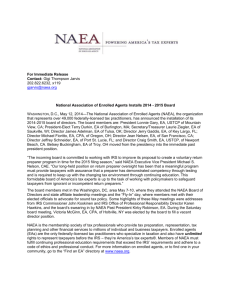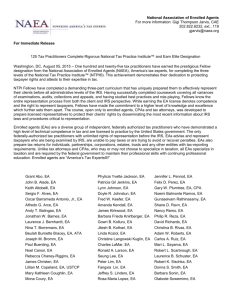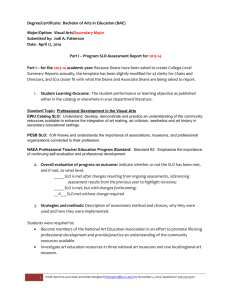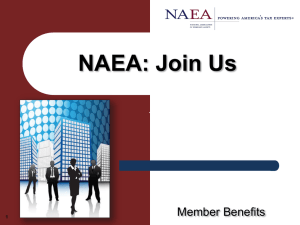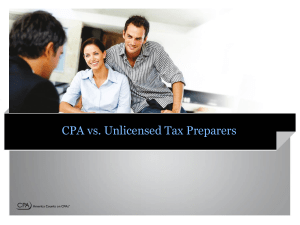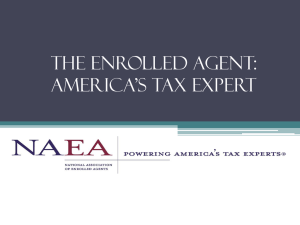2015 Winter WSEA Newsletter - Wisconsin Society of Enrolled Agents
advertisement
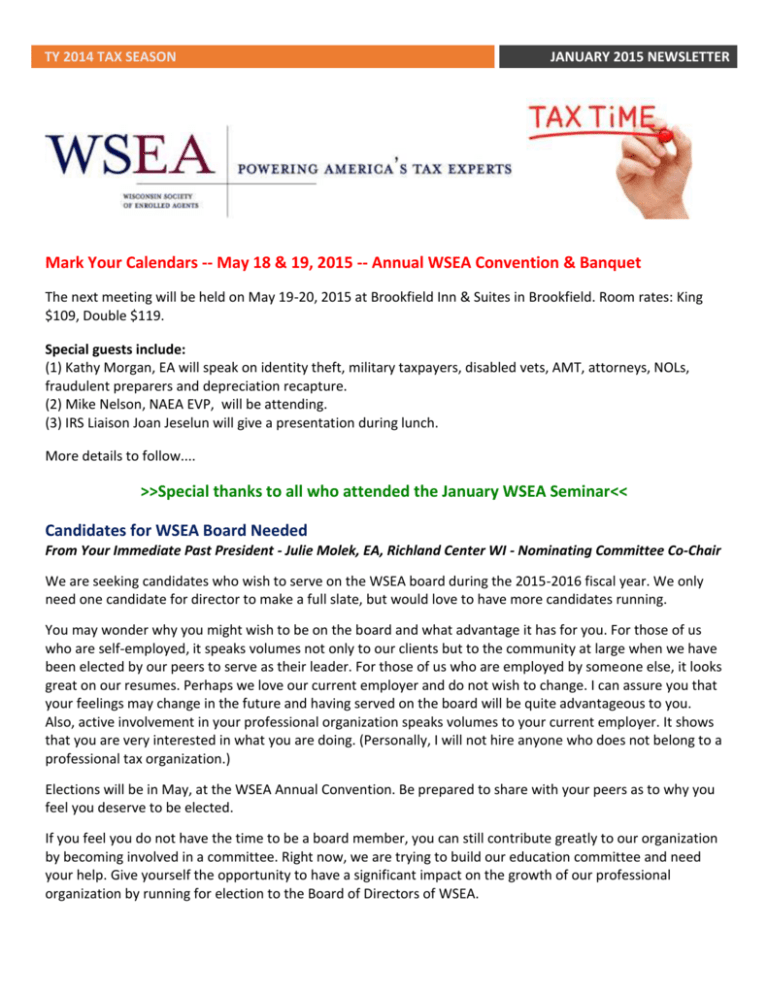
TY 2014 TAX SEASON JANUARY 2015 NEWSLETTER Mark Your Calendars -- May 18 & 19, 2015 -- Annual WSEA Convention & Banquet The next meeting will be held on May 19-20, 2015 at Brookfield Inn & Suites in Brookfield. Room rates: King $109, Double $119. Special guests include: (1) Kathy Morgan, EA will speak on identity theft, military taxpayers, disabled vets, AMT, attorneys, NOLs, fraudulent preparers and depreciation recapture. (2) Mike Nelson, NAEA EVP, will be attending. (3) IRS Liaison Joan Jeselun will give a presentation during lunch. More details to follow.... >>Special thanks to all who attended the January WSEA Seminar<< Candidates for WSEA Board Needed From Your Immediate Past President - Julie Molek, EA, Richland Center WI - Nominating Committee Co-Chair We are seeking candidates who wish to serve on the WSEA board during the 2015-2016 fiscal year. We only need one candidate for director to make a full slate, but would love to have more candidates running. You may wonder why you might wish to be on the board and what advantage it has for you. For those of us who are self-employed, it speaks volumes not only to our clients but to the community at large when we have been elected by our peers to serve as their leader. For those of us who are employed by someone else, it looks great on our resumes. Perhaps we love our current employer and do not wish to change. I can assure you that your feelings may change in the future and having served on the board will be quite advantageous to you. Also, active involvement in your professional organization speaks volumes to your current employer. It shows that you are very interested in what you are doing. (Personally, I will not hire anyone who does not belong to a professional tax organization.) Elections will be in May, at the WSEA Annual Convention. Be prepared to share with your peers as to why you feel you deserve to be elected. If you feel you do not have the time to be a board member, you can still contribute greatly to our organization by becoming involved in a committee. Right now, we are trying to build our education committee and need your help. Give yourself the opportunity to have a significant impact on the growth of our professional organization by running for election to the Board of Directors of WSEA. Please let Jeremy Burri or me know if you intend to run or be prepared to have someone nominate you from the floor. My email is: juliestaxservice@gmail.com. Thank you for your consideration. Julie Congratulations Laurie & Michelle… Laurie Zeigler was reappointed to serve as Secretary-Treasurer of NAEA. Michelle McBride EA was elected to NAEA's Affiliate Council! Public Relations News… 1. New NAEA public website EATAX.org. This website is designed for General Public. The website will be mobile friendly. The website is simple, Find EA button, a short description of EA and a video commercial advertising that EA are America’s Tax Experts. 2. AZ society of Enrolled Agents and NAEA have joined together for a major advertisement campaign around the Super Bowl (Super Bowl this year is being held in Phoenix AZ). For a few days before and after the Super Bowl an airplane will be circling over downtown Phoenix towing an enormous large banner with NAEA logo a long tail that says “WhatisEA.org” 3. NAEA will advertising on all NPR radio stations across USA during months of January and February. A portion of the ad will say Enrolled Agents – America Tax Experts go to EATAX.org for more details. Be Sure to Complete Your Membership Info for the New NAEA Membership Directory The NAEA membership directory has been redesigned it is very important for you take a couple of minutes to complete your new profile. Lots of people will be searching the “Find EA” directory because of the focused Public Awareness Campaign. It is very important for you to complete your profile information in the new directory, as your information in the old directory listing did not move across to this new listing. As you preparer to complete your new profile you can also include a picture and a bio. Here is how to update your profile: Log into your profile on the NAEA website, www.naea.org. · Click on My Account; (top right hand corner in the gold area) · Click on Update Profile · Click each of these buttons to update all areas of your profile · Update My “Find An EA” Profile · My Membership Directory Photo & Bio · Membership Directory Preferences · Contact Information · Details About You · Email Contact Preferences. NOTE: Be sure to hit SAVE and SUBMIT. CALLING ALL MENTORS – If you have been a member of NAEA/WSEA for a number of years, please get in touch with Michelle McBride. We would like to implement a Mentorship Program. More info to follow. Remove Those Circular 230 Disclaimers! by David J. Fayram, EA Some will complain that this article is too long because its point is simple.1 If you are among those, I will state the point of the article directly: if you have a jurat on your stationery or emails stating that the letter or email cannot be relied on to avoid tax penalties, you should remove them immediately. This is especially true if it mentions Circular 230. Karen L. Hawkins, Director of the Office of Professional Responsibility, has stated many times that she thinks these jurats are incorrect statements which mislead the public about Circular 230. If any of these come to her attention, she has threatened to issue a cease and desist letter to the practitioners. This will threaten their licenses to practice and might cost thousands of dollars to get straightened out. Aside from these risks, the jurats make you look unprofessional. The final regulations were issued on June 9, 2014 and were effective as of June 12, 2014.2 Whatever compliance period Hawkins might have had in mind is probably coming to an end. Furthermore, the jurats are professionally demeaning. EAs are in the business of providing tax advice which can be relied on by their clients. This business is legal, proper, and authorized by Circular 230. Why would EAs ever advertise that their advice could not be relied on? The very idea is preposterous. My partner and I have never used the disclaimers. In 2010 Ms. Hawkins agreed with me. Here is a quotation from an article which I wrote. The article appeared in the October 2010 issue of this newsletter and its title was, Proserpina?: She [Hawkins] agreed with me that those jurats at the end of emails and letters stating that any tax advice which might be contained in the email or letter cannot be used for any purpose are “silly.” The vast majority of email and letters contain no tax advice of any consequence.3 The Kernel of Truth Circular 230 was trying to deal with a real problem. People who sell tax shelters would like an opinion letter from a lawyer or a CPA (or even an EA) verifying that the promised tax benefits will materialize. Furthermore, the letter should be adequate to protect the taxpayer from penalties for understating their income (a subject not to be pursued at length here). These letters have caused problems. Sometimes they are written so broadly that they do not cover the individual circumstances of the actual taxpayer. Sometimes they assume facts which are not present in the actual transaction. Sometimes they advance frivolous interpretations of the law. Sometimes the person writing the letter has a conflict of interest because the person will receive a commission based on sales of the tax shelter, or the person himself or herself is promoting the sale of the tax shelter. All of these are legitimate concerns of the Office of Professional Responsibility and many barrels of ink have been spilled on them. For the most part, EAs are not involved in tax shelter opinion letters because EAs don’t have the professional status to benefit sellers of the shelters, but I can offer an example in the EA context. Say an unlicensed preparer has a client with business losses over several years. The preparer is unsure if these losses are covered by the “hobby loss” rules at IRC §183, “Activities not engaged in for profit”. The preparer comes to you with a request for a letter which describes the application of §183 to the facts presented by this situation and reaching a conclusion as to how the return should be prepared. This letter should be sufficient to protect the client from penalties for understatements of tax and to protect the preparer from preparer penalties on the basis that they relied on a professional, i.e. you. Circular 230 does have something to say about how you should write this letter and you should carefully follow the provisions at §10.37. If you do this, it is completely proper for you to write the letter and it should protect both the taxpayer and the preparer. The intent of all three parties is for the taxpayer and the preparer to rely on your opinion. The Problem with §10.35 In order to protect the government from unscrupulous opinions, old §10.35 used a “cookie-cutter” approach to the rules governing “reliance opinions” such as the one described above. A reliance opinion was any written advice concerning a tax shelter that concludes at a confidence level of more likely than not that one or more significant tax issues would be resolved in the taxpayers’ favor. The concept of a tax shelter here is so broad as to include everything we do with regard to tax advice. There was an important exception in that written advice was not treated as a reliance opinion if the practitioner prominently disclosed in the written advice that it was not intended or written by the practitioner to be used, and that it cannot be used by the taxpayer, for the purpose of avoiding penalties. Hence the disclaimers. The problem with these rules was that they were extremely complicated and lengthy. In the end no one could tell if a specific opinion met the rules or not. Professionals became reluctant to practice their profession and opinion letters became very expensive. The New Rules Old §10.35 was eliminated and replaced with a statement that practitioners should possess the necessary competence to engage in practice before the IRS. The definition of “competence” is broad enough that a person of goodwill should be able to meet it. The fact that old §10.35 was eliminated will be the basis for Hawkins’ cease and desist letter. The rules at old §10.35 were replaced in new §10.37 with general rules such as, “1. Base the written advice on reasonable factual and legal assumptions (including assumptions as to future events). 2. Reasonably consider all relevant facts and circumstances that the practitioner knows or should know.” These rules use general terms that could cut either for the practitioner or for the government depending on the circumstances. Be Careful out There Despite the changes, the substance of the problem remains. The government still insists that it will aggressively protect itself against the “relied on a professional” defense. Clients have a big incentive to blame the preparer when things go off the tracks. The fact that Circular 230 rules are less specific means that the spotlight will turn again to Neonatology Associates, P.A.4 which is a well-respected case establishing three general rules for the defense: 1. The advisor must be a competent and qualified professional who had sufficient expertise to justify the taxpayer’s reliance. 2. The taxpayer provided all necessary and accurate information to the advisor. 3. The taxpayer actually relied in good faith on the advisor’s judgment concerning the proper tax treatment of the item at issue. The case provides a roadmap when the intention is to provide protection to taxpayers seeking advice. 1 The author is indebted to two recent articles: Caroline D. Ciraolo, Circular 230—Regulations and a New Principles-Based Approach, 16, 4 J. Tax Practice & Procedure (Wolters), 43, (Aug-Sep 2014). Richard M. Lipton, IRS Finalized Revisions to Circular 230, 121, 3, J. Tax’n (Thompson), 120, (September 2014). 2 T.D. 9668, RIN 1454-BF96 (June 9, 2014). 3 This article was prescient in that it anticipated all the problems Hawkins would have in regulating unlicensed preparers without Congressional approval. Back in 2010, she made it abundantly clear that her intention was to accomplish the whole thing administratively without a new law. The title of the article and the fact that it was somewhat critical got me in trouble with her and with NAEA. I am thankful that Don Wollersheim and WSEA supported me. 4 Neonatology Associates, P.A., 115 TC 45 (2000), aff’d, 299 F3d 221, 90 AFTR2d 2002-5442 (CA-3, 2002). A Message from WSEA President Michelle McBride – 2015 Fly-In Day – May 12 & 13 Each year, NAEA brings together enrolled agents from across the country to spend a day on Capitol Hill to meet face-to-face with their elected representatives and their staff members to discuss issues important to taxpayers and the EA profession. Now that our elected representatives have been sworn-in to serve in the 114th Congress, NAEA is gearing up for the 2015 Fly-in Day, which is scheduled for May 12th and 13th in Washington, DC. This event gives our members the opportunity to raise their profile with congressional policymakers and advance our public policy agenda on behalf of the profession. Past agenda topics have included the EA credential and its strengths in the tax practitioner community, return preparer oversight, tax administration issues and reform efforts needed to ensure an efficient tax system. If you have not paid a visit to your legislators before, we will provide you with the tools to make them effective meetings. All participants, including veterans and first-timers, will gain first-rate training on the direct approach to public advocacy. In 2014, Matt Greenblatt, Trish Evenstad, Laurie Ziegler & I represented Wisconsin. We’d love to have more districts represented. It was a fantastic educational experience. A fun time was had by all!!! Additional information can be found on the NAEA website. Fly-in agenda: Tuesday, May 12th - Advocacy training and briefing on NAEA's public policy agenda. Wednesday, May 13th - Continental breakfast and group meet-up. Personal meetings with congressional staff and Members of Congress (dependent on office schedule). Open bar reception with hors d'oeuvres and debriefing with special guest speaker. If you are interested in attending this year's Fly-in, please submit your application to participate by March 2nd. Space is limited. We want to make sure we have room for everyone. Before booking flights or making reservations for room accommodations, please submit your application and wait for a registration confirmation. We will promptly turn around these applications from members in order to assist them with making timely travel arrangements. Please fully complete the application and submit it no later than March 2, 2015. While many of you use your business address for NAEA purposes, we respectfully request that you include only your home address on your Fly-in application. NAEA needs this information for the purpose of scheduling your congressional meetings with your elected representatives. If you have any questions, please email Justin Edwards, NAEA's Government Relations Manager. Michelle P.S.- Be thinking of becoming a Mentor. Call me to get the conversation started. Thanks. Why Did I Join NAEA/WSEA? Thoughts shared by Peg Ferkey EA Let’s be honest – the reason we generally join organizations or clubs is because we are looking to gain something. I wanted to develop a network of peers and a source to gain knowledge and stay up-to-date with tax changes. The advice and support I got starting my business was invaluable. I remain a member of NAEA/WSEA because I still value these relationships. Members of NAEA and specifically, WSEA, are very approachable and eager to share their knowledge. If you have not yet visited our Facebook page – please do so (Wisconsin Society of Enrolled Agents – it’s a closed group, so you’ll need to request to join). We all know that NAEA defines an EA as follows: Enrolled agents (EAs) are America's Tax Experts. EAs are the only federally-licensed tax practitioners who specialize in taxation and also have unlimited rights to represent taxpayers before the IRS. Does this mean that you should not be a member if you don’t do representation work, or that you should feel like a lesser EA for not doing so? Of course not! I recently spoke with someone who inferred this. CPA stands for Certified Public Accountant, yet many CPA’s choose to specialize in other areas, including taxes. I think being an EA is the same. We have the power to represent taxpayers, but it’s ok if we decide not to focus our business on that. However, if a client, family member, friend, etc. needs help, where better to turn for information than WSEA/NAEA? NAEA has a great program called NTPI which teaches one how to do representation work. You’ve also got a huge pool of experienced representation experts to refer your client to if you choose to do so. The goals of WSEA are to foster the professional growth of its members; to be an advocate of taxpayer rights; to enhance the role of the Enrolled Agent among government agencies, other professions and among the public at large; and to protect the interest of its members. “To enhance the role of the EA” – that should be reason enough to become and stay a member of NAEA/WSEA. How great will it be when we can say that we are an EA and not get a blank stare in return? How about you? What can we do to help you? What might you have to offer to others? What is your story? We’d truly love to hear. Email us at wsea@tm.net. New Wrinkle in Return Preparer Penalties by David J. Fayram, EA SEC. 6701. PENALTIES FOR AIDING AND ABETTING UNDERSTATEMENTS OF TAX LIABILITY (a) IMPOSITION OF PENALTY.—Any person— (1) who aids or assists in, procures, or advises with respect to, the preparation or presentation of any portion of a return, affidavit, claim, or other document, (2) who knows (or has reason to believe) that such portion will be used in connection with any material matter arising under the internal revenue laws, and (3) who knows that such portion (if so used) would result in an understatement of the liability for tax of another person, shall pay a penalty with respect to each such document in the amount [of $1,000 for each individual return.] We all know about this penalty, and assume (as I did) that it does not apply to us because we would never knowingly prepare an incorrect return. Imagine my incredulity when I discovered that the IRS thinks it can impose this penalty on one who did not know the returns were wrong! Furthermore, I discovered that it has judicial support for this position in two Circuit Courts. In the Eighth Circuit we have Mattingly v. United States.4 In the Second Circuit we have Barr v. United States.4 EAs should know about these two because Matttingly, as it has been interpreted by the IRS, is an outrageous interpretation of the law. I discovered the problem when I was reading about another case called Carlson.4 Here is what happened to Fran Carlson. She was hired by a JH Accounting, Inc. and Simple Financial Solutions, Inc. which were owned by one Daniel Prewett and did business as, “Jackson Hewitt.” She did not have any previous experience with tax return preparation, but she did attend an in-house course conducted by Mr. Prewett. After completing the course, the she began preparing federal income tax returns for customers of Jackson Hewitt. In her second year of employment, she began to prepare corporate returns. Eventually, the IRS discovered that deductions could not be substantiated in some of the returns prepared by Fran. The IRS assessed penalties against her under Code Sec. 6701 for aiding and abetting understatements of tax liability. A jury trial was held and the jury returned a verdict for the IRS on all penalties. She appealed to the Eleventh Circuit. I corresponded via email with my friend, and sometime speaker at WSEA seminars, Bryan Gates about the case. Here is Bryan’s first response to my email: I helped Fran Carlson plan her defense and find an attorney who would represent her for less than $100,000. I was particularly interested because when representing another TP a few months earlier, I had argued at Appeals that the Gov’t, as a hazard of litigation, could not meet its burden of proof with respect to 6701. Both the AO and Technical Issue Coordinator laughed and said that if I thought that was true, my client should litigate. The client could not find an attorney who would take the case for less than $100,000. He paid the $33,000 6701 assessment. The Service knows how expensive it is to litigate and refuses to concede meritorious arguments presented by the little guys. So sad… This is the reality of IRS penalty litigation. Now for a few more details about Carlson. In 2006, Mr. Prewett was arrested for cocaine distribution and money laundering. Fran quit. She had prepared about 1,400 returns over a period of about five years and the IRS found 40 where the deductions could not be substantiated. The IRS proposed the penalties against her, she paid 15% of the penalties and filed for a refund. Her claim was denied and she filed suit in district court. In the district court, the government conceded 13 of the penalties and the remaining 27 went to a jury. The jury found for the government in the amount of $119,173.12. Fran appealed to the Eleventh Circuit. The crucial facts come from the following paragraph in the opinion from the Eleventh Circuit: In each of the penalties Carlson challenges on appeal, the Government presented no evidence suggesting that Carlson actually knew the returns understated the correct tax. The Government only presented evidence that an auditor identified deductions that the taxpayer[s] could not substantiate. In contrast, Carlson presented substantial evidence from multiple witnesses showing that she did not know the returns understated the correct tax. As the Government notes, the jury was free to disbelieve Carlson’s witnesses. But, even if the jury completely discredited every one of Carlson’s witnesses and Carlson’s own testimony, the Government still failed to adduce evidence meeting its burden of proof [that she knew about the understatements]. After reading the statutory definition at the beginning of this article, with its repeated use of the word “knows,” one is baffled as to how the district court and the IRS could have gone so far astray. There is a wonderful discussion in Carlson about “burden of proof” as it relates to section 6701, Mattingly, Barr, and this case. In that discussion, the idea from Mattingly that a tax return preparer could not be aware that the return was wrong and still be penalized under section 6701, is completely deconstructed. So. Bryan was right all along, but Carlson was not decided in time to help his client. Furthermore, it would have been extremely difficult for Bryan, or any other EA, to fix the problem caused by the Eighth Circuit in Mattingly twenty-three years ago. As long as there was nothing on the other side of the authority scale, the appeals officer would probably have been obliged to follow it. Now matters might have been set right. EAs can cite Carlson in Appeals if the IRS tries to apply section 6701 to an unknowing tax return preparer. 1 Donnell R. Mattingly v. United States, 924 F.2d 785 (8th Cir. 1991), 91-1 USTC ¶ 50,068. 2 Sheldon Barr v. United States, 67 F3d 469 (2nd Cir. 1995), 95-2 USTC ¶ 50,572. 3 Frances Carlson v. United States, citation not available (11th Cir. 2014), 2014-1 USTC ¶ 50,321. ACA Tidbits By now, you should have attended at least one, if not several seminars/webinars on the Affordable Care Act and have a basic understanding of what you need to do to prepare the Health Insurance reporting portion of your client’s 2014 federal tax return. Here are some tidbit Q & As that may make your job easier. Q1: How can my client find out when they had insurance coverage? A1: Contact the health insurance plan carrier to ask which months the plan covered. The phone number is usually on the back of the member ID card. Q2: How do I know if someone was approved for exemption from ACA? A2: Anyone who has been approved to have the IRS penalty waived (for going without health insurance in 2014) should have received a unique six- or seven-digit approval code through a notice from the Health Insurance Marketplace, Department of Health and Human Services. This code is called an exemption certificate number (ECN). Q3: Where can I get more info on the ACA and Marketplace? A3: Go to: http://www.irs.gov/Affordable-Care-Act/Health-Care-Tax-Tips2 and https://www.healthcare.gov/. WI DOR Tax Update Seminars - Now on Video WI DOR Tax Update Seminar Videos are at: http://www.revenue.wi.gov/taxprofessionals/index.html. …Editor’s Note Content articles, comments, suggestions, ideas, tidbits, Q & A are always welcome, as are Getting to Know you thoughts, like Peg Ferkey shared. This is your newsletter, so feedback is always welcome. Submissions can be in any format, but preferably a Word document. Please submit to: Mary Olson EA, WSEA Newsletter Editor, at: tax@theiolataxplace.com.
